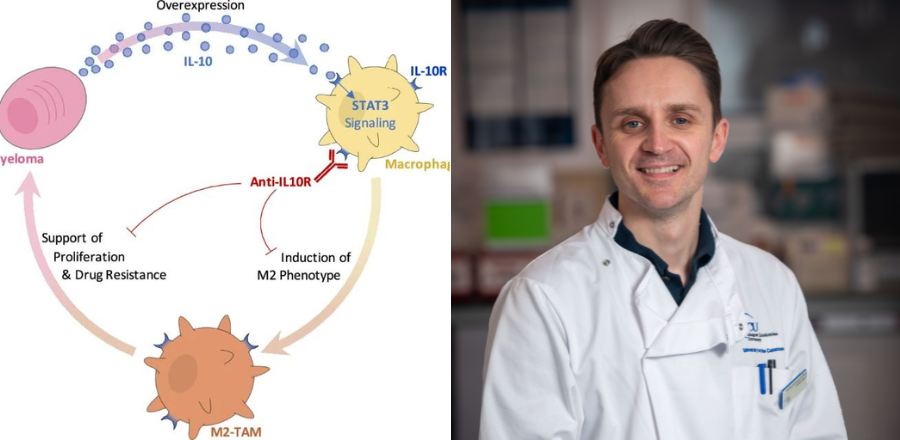The Williams Blood Cancer Research Group joined world leaders in new Multiple Myeloma study

Blood cancer researchers in Glasgow Caledonian’s School of Health and Life Sciences have made a significant contribution to a major new Multiple Myeloma (MM) focused study.
Research, led by world-renowned Multiple Myeloma and Drug Delivery expert Professor Kareem Azab, of the UT Southwestern Medical Center in Texas, USA, has discovered a new pathway to block drug-resistance in MM patients that could improve survival rates.
The Williams Blood Cancer Research Group in the Research Centre for Health (ReaCH) and the Department of Biological and Biomedical Sciences was delighted to be involved in such a high-profile research paper.
Dr Mark Williams, who leads the blood cancer research group at the University, worked with 2nd year PhD student Stefan Corradini and former PhD student Dr Katerina Miari, on the paper.
They were also delighted to work with another big name in global cancer research, Professor Shaomeng Wang, Director of the Michigan Center for Therapeutic Innovation at the University of Michigan, on the study.
Dr Williams said: “I was delighted to be involved in this excellent collaborative study with the Azab and Wang Labs, and we are looking forward to more collaborative studies between our research labs, to identify and develop better and safer treatments for Myeloma/blood cancer patients.”
The paper, entitled 'IL-10R inhibition reprograms tumor-associated macrophages and reverses drug resistance in multiple myeloma', has been published in the Haemato-Oncology journal Leukemia, which is part of the Nature Publishing Group. Read the full paper here - https://www.nature.com/articles/s41375-024-02391-8.
Multiple Myeloma (MM) is an incurable cancer with the disease progressing in most patients despite an increase in available treatment options.
Dr Williams said: “Patients with MM are a clinically under-served group, with less than 30% of MM patients surviving for 10 years of more. This is in stark contrast to most other cancer patients in which 50-55% of patients survive for 10 years or more. One of the major reasons for poor survival outcomes in MM patients is due to the development of drug resistance. It is known that immune cells known as macrophages, can drive drug resistance in Myeloma.
“This major study showed that MM cells release a substance called interleukin-10 (IL-10), which affects nearby immune cells called macrophages. IL-10 binds to specific receptors on these macrophages, activating a protein named STAT3. This process changes the macrophages so they help Myeloma cells grow and resist treatments like the steroid dexamethasone.”
Dr Williams is a Lecturer in Cancer Biology. Find out more about our Biological and Biomedical Sciences courses - https://www.gcu.ac.uk/study/subjects/biologicalandbiomedicalsciences
